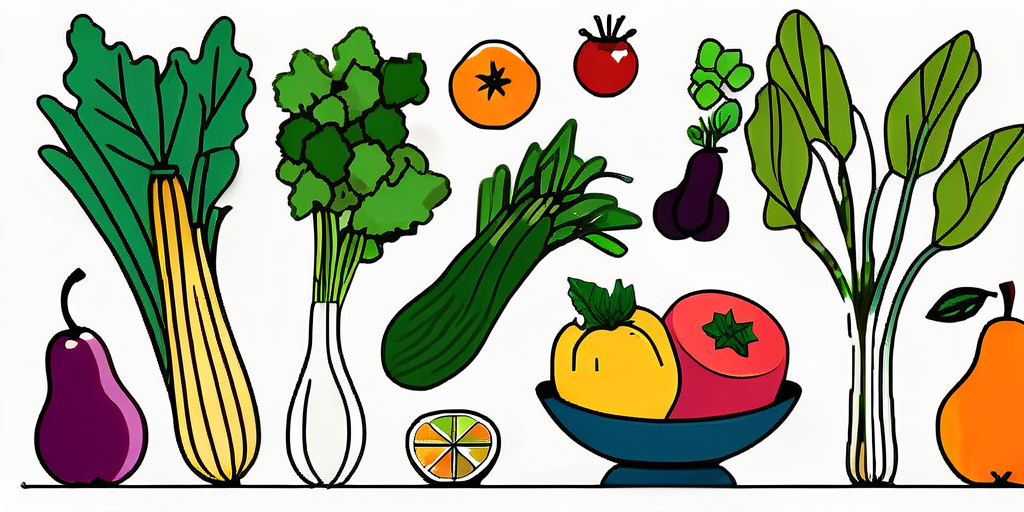In today's fast-paced world, maintaining a healthy diet can sometimes feel like an uphill battle. With temptations constantly surrounding us and conflicting information about nutrition, it's essential to have a comprehensive understanding of healthy eating habits. In this ultimate guide, we will explore the importance of healthy eating, debunk common myths, delve into the basics of a balanced diet, and provide tips for building your own healthy eating plan. We will also discuss strategies for overcoming challenges and maintaining healthy eating habits long-term.
Understanding the Importance of Healthy Eating
Healthy eating is not just a passing trend; it is essential for overall well-being. Research has consistently shown that our diet plays a crucial role in our physical and mental health. The nutrients we consume through food provide us with energy, support the functioning of our organs, and boost our immune system. Moreover, a balanced diet has been linked to a reduced risk of chronic diseases such as obesity, diabetes, heart disease, and certain types of cancers.

When it comes to healthy eating, it's not just about counting calories or following the latest fad diet. It's about nourishing our bodies with the right combination of nutrients to thrive. A well-balanced diet consists of a variety of foods from different food groups, including fruits, vegetables, whole grains, lean proteins, and healthy fats.
The Connection Between Diet and Health
The food we eat serves as fuel for our bodies, providing essential vitamins, minerals, and macronutrients. These nutrients support the proper functioning of our bodily systems and help prevent deficiencies and diseases. For example, calcium is necessary for maintaining strong bones and teeth, while vitamin C boosts our immune system and promotes collagen production.
But it doesn't stop there. The benefits of a healthy diet extend beyond physical health. Research has shown that what we eat can also impact our mental well-being. Certain nutrients have been found to have a direct effect on brain function and mood regulation. For instance, omega-3 fatty acids, found in fatty fish, walnuts, and flaxseeds, have been shown to reduce symptoms of depression and anxiety. Additionally, a diet high in antioxidants, found in fruits and vegetables, can protect our brain cells from damage and slow cognitive decline.
Debunking Common Myths About Healthy Eating
With so much information available, it's easy to fall prey to common myths about healthy eating. Let's take a moment to dispel some of these misconceptions:
- Myth 1: Carbohydrates are always bad for you. In reality, carbohydrates are our main source of energy, and whole grains, fruits, and vegetables are essential for a balanced diet.
- Myth 2: You need to avoid fats entirely. While it's important to choose healthy fats like those found in avocados and olive oil, completely eliminating fats can lead to nutrient deficiencies.
- Myth 3: You have to cut out all sugar. It's true that excessive sugar consumption can be harmful, but naturally occurring sugars in fruits and dairy products are part of a healthy diet.
By busting these myths, we can make informed choices about our diets and embrace healthy eating habits without unnecessary restrictions. It's important to remember that healthy eating is not about deprivation or strict rules. It's about finding a balance that works for our individual needs and preferences.
In conclusion, understanding the importance of healthy eating goes beyond surface-level knowledge. It involves recognizing the profound impact our diet has on our physical and mental well-being. By nourishing our bodies with a variety of nutrient-rich foods, we can optimize our health, reduce the risk of chronic diseases, and enhance our overall quality of life.
The Basics of a Balanced Diet
A balanced diet consists of a variety of foods that provide all the essential nutrients our bodies need in the right proportions. It is the foundation of good health and plays a crucial role in maintaining overall well-being. In this expanded version, we will delve deeper into the key elements of a balanced diet and explore the importance of each component.
Essential Nutrients and Where to Find Them
Protein, carbohydrates, fats, vitamins, and minerals are considered essential nutrients because they are necessary for optimal health. Each nutrient has a specific role in our body, and obtaining them in the right amounts is vital for proper functioning.
Let's start with protein, which is essential for building and repairing tissues. Including a mix of lean meats, legumes, whole grains, nuts, and seeds in your diet ensures that you obtain all the necessary macronutrients. These sources of protein not only provide the building blocks for our muscles but also contain other important nutrients like iron and zinc.
Carbohydrates, on the other hand, are our body's primary source of energy. They fuel our brain, muscles, and organs, enabling us to perform daily activities. Whole grains, fruits, and vegetables are excellent sources of complex carbohydrates, which provide a steady release of energy and are rich in fiber, vitamins, and minerals.
Fats, often misunderstood, are an essential part of a balanced diet. They provide energy, help absorb fat-soluble vitamins, and are crucial for the development of cell membranes. Opt for healthy fats found in avocados, nuts, seeds, and olive oil, while limiting saturated and trans fats.
Additionally, fruits and vegetables are rich sources of vitamins and minerals. These micronutrients play a vital role in various bodily functions, such as maintaining a healthy immune system, promoting good vision, and supporting bone health. Aim for a colorful plate that includes a range of vibrant produce to ensure you're getting a diverse array of nutrients.
The Role of Portion Control in Healthy Eating
While the quality of our food choices is important, portion control is also crucial for maintaining a balanced diet. Even healthy foods can lead to weight gain if consumed excessively. It's essential to strike a balance between enjoying our favorite foods and practicing moderation.
Practicing mindful eating is a valuable tool in portion control. By paying attention to our body's hunger and fullness cues, we can better gauge when to start and stop eating. This mindful approach allows us to savor each bite and prevents overeating.
Another helpful tip is to be aware of recommended portion sizes. It's easy to underestimate or overestimate how much we're actually consuming. By familiarizing ourselves with appropriate portion sizes, we can ensure that we're meeting our nutritional needs without going overboard.
Consider using smaller plates to help control portion sizes. Research has shown that using smaller plates can trick our minds into feeling satisfied with less food. This simple yet effective strategy can prevent overeating and promote a balanced diet.
In conclusion, a balanced diet is not just about eating a variety of foods but also understanding the importance of essential nutrients and practicing portion control. By incorporating a diverse range of nutrient-rich foods and being mindful of our portion sizes, we can achieve optimal health and well-being.
Building Your Own Healthy Eating Plan
Creating a personalized healthy eating plan is essential for long-term success. Here are a few tips to get you started:

When it comes to building a healthy eating plan, it's important to take a gradual approach. Setting realistic goals for yourself is key. Instead of attempting drastic changes overnight, focus on making small, sustainable modifications to your current eating habits. This way, you can ease into the process and make it more manageable.
One effective strategy is to gradually incorporate more whole foods into your diet. These are foods that are as close to their natural state as possible, such as fruits, vegetables, whole grains, and lean proteins. By including more of these nutrient-dense options in your meals, you'll be providing your body with the essential vitamins, minerals, and fiber it needs to thrive.
In addition to increasing your intake of whole foods, it's also important to reduce your consumption of processed foods. These are foods that have undergone extensive processing and often contain added sugars, unhealthy fats, and artificial ingredients. By cutting back on processed foods, you'll be reducing your intake of empty calories and potentially harmful substances.
Another aspect to consider when building your healthy eating plan is hydration. Increasing your water consumption is a simple yet powerful way to support your overall well-being. Water helps to flush out toxins, aids in digestion, and keeps your body functioning optimally. Aim to drink at least eight glasses of water per day, and remember to adjust this amount based on your activity level and individual needs.
While it's important to strive for progress, it's equally important to celebrate every small victory along the way. Remember that building a healthy eating plan is a journey, and progress is often more valuable than perfection. Whether it's choosing a piece of fruit over a sugary snack or cooking a homemade meal instead of ordering takeout, each positive choice you make contributes to your overall well-being.
Tips for Incorporating Variety into Your Diet
Avoid falling into a rut by adding variety to your meals. Experiment with new recipes, explore different cuisines, and try unfamiliar fruits and vegetables. By diversifying your food choices, you not only enhance the nutritional value of your diet but also make it more exciting and enjoyable.
One way to incorporate variety is by trying out new recipes. There are countless resources available, such as cookbooks, websites, and cooking shows, that can inspire you to try new dishes. Whether it's a flavorful stir-fry, a hearty salad, or a comforting soup, experimenting with different recipes can introduce you to new flavors and ingredients.
Exploring different cuisines is another great way to add variety to your diet. Each culture has its own unique culinary traditions and ingredients. Whether it's Thai, Mexican, Indian, or Mediterranean cuisine, you can discover a whole new world of flavors and textures by venturing beyond your usual food choices.
Don't be afraid to step out of your comfort zone and try unfamiliar fruits and vegetables. Farmers markets and grocery stores often offer a wide range of produce that you may not have tried before. From exotic fruits like dragon fruit and lychee to lesser-known vegetables like kohlrabi and jicama, there's a whole world of delicious and nutritious options waiting to be explored.
By incorporating variety into your diet, you'll not only prevent boredom but also ensure that you're getting a wide range of nutrients. Different foods offer different vitamins, minerals, and antioxidants, so by diversifying your food choices, you'll be providing your body with a broader spectrum of essential nutrients.
Overcoming Challenges to Healthy Eating
While it may seem challenging to maintain healthy eating habits consistently, there are strategies to help you overcome common obstacles:

Strategies for Eating Healthy on a Budget
Eating healthy doesn't have to break the bank. Plan your meals ahead, make a shopping list, and stick to it. Buy seasonal, locally grown produce, as it tends to be more affordable. Consider buying in bulk or taking advantage of sales to stock up on staples like whole grains, dried legumes, and canned goods.
Dealing with Dietary Restrictions and Allergies
If you have dietary restrictions or allergies, planning your meals becomes even more crucial. Take the time to research alternatives and substitute ingredients to ensure you're still getting a balanced diet. Consult with a registered dietitian for personalized recommendations and support.
Maintaining Healthy Eating Habits Long-Term
Adopting healthy eating habits is a lifelong journey. Here are some strategies to help you stay on track:
The Role of Mindful Eating
Practice mindful eating by paying attention to your food, savoring each bite, and eating slowly. This allows you to truly enjoy your meals, recognize feelings of hunger and fullness, and avoid mindless overeating. By being present during mealtimes, you can develop a healthier relationship with food and make mindful choices.
Staying Motivated and Tracking Progress
Stay motivated by tracking your progress and celebrating your achievements. Keep a food diary or use a smartphone app to monitor your eating habits. Celebrate milestones along the way, such as reaching a new fitness goal or trying a new healthy recipe. Surround yourself with a supportive community or seek the advice of a nutrition professional to stay accountable and motivated.
Healthy eating is not about deprivation or strict rules; it's about nourishing your body with wholesome foods and creating a sustainable lifestyle. By understanding the importance of healthy eating, debunking myths, and implementing practical strategies, you can embark on a journey towards a healthier and happier you.




